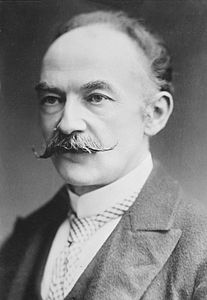Analysis of At the War Office, London.
Thomas Hardy 1840 (Stinsford) – 1928 (Dorchester, Dorset)
Last year I called this world of gain-givings
The darkest thinkable, and questioned sadly
If my own land could heave its pulse less gladly,
So charged it seemed with circumstance whence springs
The tragedy of things.
Yet at that censured time no heart was rent
Or feature blanched of parent, wife, or daughter
By hourly blazoned sheets of listed slaughter;
Death waited Nature's wont; Peace smiled unshent
From Ind to Occident.
| Scheme | ABBAA CDDCC |
|---|---|
| Poetic Form | Etheree (20%) |
| Metre | 111111111 010101010 11111111110 111111011 010011 1111011111 11011101110 1101111010 110101111 11110 |
| Closest metre | Iambic pentameter |
| Characters | 444 |
| Words | 75 |
| Sentences | 3 |
| Stanzas | 2 |
| Stanza Lengths | 5, 5 |
| Lines Amount | 10 |
| Letters per line (avg) | 35 |
| Words per line (avg) | 7 |
| Letters per stanza (avg) | 174 |
| Words per stanza (avg) | 36 |
Font size:
Submitted on May 13, 2011
Modified on May 02, 2023
- 22 sec read
- 480 Views
Citation
Use the citation below to add this poem analysis to your bibliography:
Style:MLAChicagoAPA
"At the War Office, London." Poetry.com. STANDS4 LLC, 2024. Web. 30 Apr. 2024. <https://www.poetry.com/poem-analysis/36341/at-the-war-office%2C-london.>.


Discuss this Thomas Hardy poem analysis with the community:
Report Comment
We're doing our best to make sure our content is useful, accurate and safe.
If by any chance you spot an inappropriate comment while navigating through our website please use this form to let us know, and we'll take care of it shortly.
Attachment
You need to be logged in to favorite.
Log In